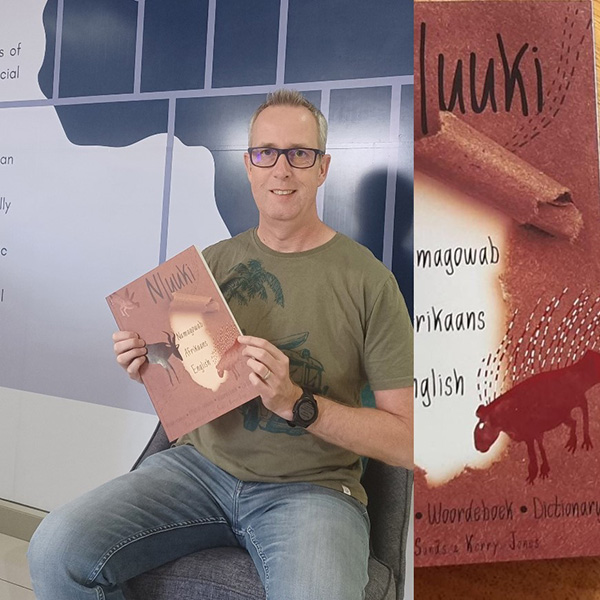The first-ever dictionary for N|uu, one of South Africa’s highly endangered minority languages with only one remaining fluent speaker, has been awarded the ATKV Wordwise Prize (Woordwystoekenning) for 2023 at the ATKV Woordveertjies (Afrikaans Language and Culture Association Word Feathers), an annual celebration of outstanding contributions around the Afrikaans word.
The dictionary, N|uuki Namagowab, Afrikaans, English Woordeboek / Dictionary (2022), with Bonny Sands and Kerry Jones as editors-in-chief, was singled out by the judging panel for its exceptional innovative approach, scope and community orientation in capturing the known vocabulary of this near-extinct language of the San people in the Northern Cape.
Making language more accessible
The South African Centre for Digital Language Resources (SADiLaR) at the North-West University (NWU) played a leading role in making the dictionary accessible. SADiLaR converted the dictionary data, along with audio files for many words, and made it digitally available via an online dictionary platform and app – in addition to a physical dictionary.
“It is a wonderful accolade for SADiLaR, as it showcases what can be done with language data in the digital context,” says Prof Menno van Zaanen, a professor in digital humanities at SADiLaR. “Having the data available in such a way really allows people to learn more about these languages, but it also gives these languages a certain status. Because of the dictionary (in its different forms), the language is more accessible.”
Prof Van Zaanen worked closely with the editors and field linguists Kerry and Bonny to ensure consistency in the data that was collected over the last approximately 20 years.
“Data from field linguists is often kept for research purposes but not often used to create dictionaries. To do this, quite a lot of work needs to be done to make sure the data is consistent and complete,” he says.
“I converted the data, which was put together by Kerry and Bonny in a spreadsheet, into suitable formats for the app and the dictionary portal. I also converted the data into a format that allowed for the printing of the dictionary. I handled all the layout of the inside of the dictionary as well, just not the cover of the dictionary, which I think is really nice as well.”
First dictionary of this nature
The dictionary is quadrilingual, consisting of the languages N|uu, Namagowab (Nama), Afrikaans and English.
“The first part of the dictionary is a collection of all the known words of the N|uu language, followed by Nama, Afrikaans and English sections which cover the translations of the N|uu words,” explains Prof Van Zaanen. “There is also some information that is only presented in the N|uu part (like part of speech). In total, the dictionary contains 9 125 entries of which 1 801 entries are for N|uu only.”
The dictionary also contains pronunciation information for the N|uu words, which is done using the International Phonetic Alphabet, which most members of the general public may find difficult to read.
“For this reason, the app and portal have audio recordings which allow people to listen to the sounds,” says Prof Van Zaanen.
“This is the first dictionary for N|uu and Nama of this nature. As minority languages, they are preserved and made accessible to other language users by giving equivalents of the vocabulary in Afrikaans and in English,” the Afrikaans Language and Culture Association (ATKV) stated in its official announcement about the winners.
“In terms of innovation, the dictionary is also available digitally and audio files are included for many words. This makes the dictionary accessible and very innovative with a contemporary digital footprint for two languages that are in danger of disappearing.
“Another first is the inclusion of a variety of Afrikaans which, alongside Standard Afrikaans, is known as ‘Onse Afrikaans’ (Our Afrikaans) and spoken especially in the Northern Cape. Onse Afrikaans is probably the first variety of Afrikaans to be recorded.
He says the combination of the online dictionary, the audio files and the additional material in the pre-work of the dictionary, makes it more than just a dictionary. “It is an extensive reference source that documents a minority language.”
Close collaboration with community
The dictionary project involved close collaboration with community members who speak Nama and N|uu, including the 90-year-old Ouma Katrina Esau. She is the last surviving fluent N|uu speaker and has done incredible work during her lifetime to help preserve her mother tongue and teach it to others.
Since the publication of the N|uu dictionary, Prof Van Zaanen has already been approached by people to do something similar for other languages, for example Nama. “I think it is wonderful to create dictionaries like these, in particular if we can make them freely available to the general public.”
* Visit the N|uu online dictionary portal and download the N|uu language dictionary app, named Saasi Epsi from Google Play Store.

Prof Menno van Zaanen with a copy of the N|uuki Namagowab, Afrikaans, English Woordeboek / Dictionary.
